These women could make history in November’s midterms
A number of female candidates could make history in gubernatorial, House and Senate races this election cycle.
Voters will have the opportunity to elect some of the first openly lesbian women for governor, perhaps the first Gen Z female candidate to Congress and some of the first Black women for governor and Congress in their states, to name a few.
Those firsts demonstrate the diversifying candidacies that could play a key role in shaping American politics while also serving as a stark reminder of the continued barriers that women face in achieving higher office, particularly when it comes to race, sexuality, age and other aspects of identity.
Here’s a look at some of the female candidates this election cycle that could make history.
Black women could rack up historic firsts
States across the country could see their first Black female governors, senators and representatives in Congress.
The country has yet to elect a Black female governor. This year, a handful of Black women are running for that position, including Stacey Abrams (D) in Georgia, Deidre DeJear (D) in Iowa, Yolanda Flowers (D) in Alabama and Constance Every (I) in Tennessee.

Democratic candidate for Georgia Governor Stacey Abrams poses for a portrait in front of the State Seal of Georgia in Decatur, Ga.
Other Black women are running for Senate, including Rep. Val Demings (D) in Florida, Cheri Beasley (D) in North Carolina, Natalie James (D) in Arkansas and Krystle Matthews (D) in South Carolina. There have only been two Black female senators in U.S. history: former Sen. Carol Moseley Braun (D) of Illinois and now-Vice President Harris, who represented California.
Meanwhile, on the House side, Pennsylvania state Rep. Summer Lee (D), who won a competitive primary in May for the state’s 12th Congressional District, has a good chance at becoming the Keystone State’s first Black congresswoman; her race has been rated “likely Democratic” by the nonpartisan Cook Political Report.
Vermont poised for first female representative in Congress
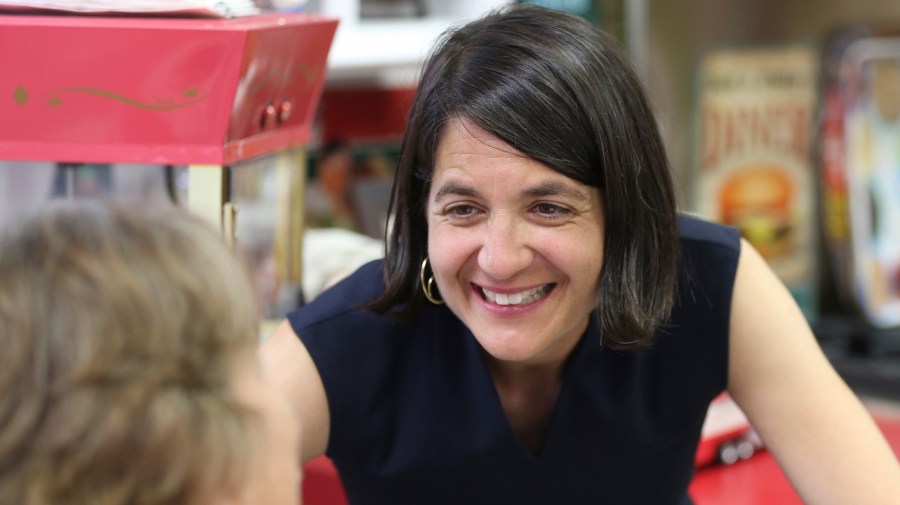
Vermont state Sen. Becca Balint speaks to voters in Colchester, Vt.
State Senate President Pro Tempore Becca Balint (D) is likely to become the first woman to represent the state of Vermont in Congress after she won the Democratic House primary against Lt. Gov. Molly Gray in August.
Balint is no stranger to setting precedents, previously becoming both the first openly gay person and first woman in the state Senate to serve as president pro tempore. If Balint wins in November, she would become the first openly gay member of Congress to represent Vermont as well.
Kelly Dittmar, director of research and scholar at the Center for American Women and Politics at Rutgers University, said that part of the reason Vermont likely hasn’t sent a congresswoman to Washington is due to the fact that the state only has one at-large representative and two senators, seats which have seen few openings.
Arkansas could get its first female governor
Arkansas is very likely to see its first female governor after Sarah Huckabee Sanders, former President Trump’s White House press secretary and the daughter of former Arkansas Gov. Mike Huckabee (R), won the GOP primary in May.
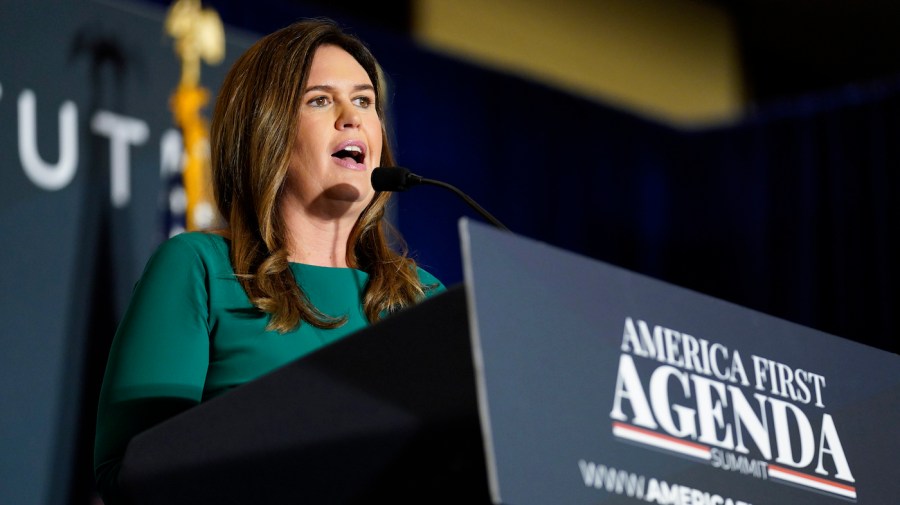
Former White House press secretary Sarah Huckabee Sanders speaks before former President Donald Trump at an America First Policy Institute agenda summit at the Marriott Marquis in Washington.
Dittmar said one of the barriers women experience in running for governor has to do partly with “the differences in executive office versus legislative office and voter perceptions.”
“So when voters are selecting executives, first of all, they’re selecting one person to lead. And there has been a historic association of like that ‘sole heroic, executive leader, father of our nation’ to be very masculine and associated with men,” she continued. “And the idea that what you need in executive leadership, the traits and the expertise, that those are more often associated with stereotypes of masculine traits and masculine expertise.”
Possible first openly lesbian female governors
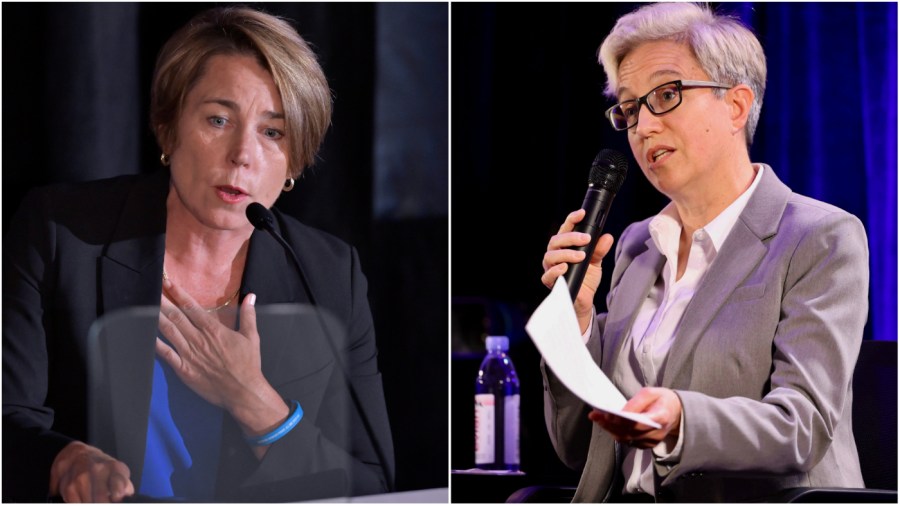
Maura Healey (left) and Tina Kotek (right) speak during events.
State Attorney General Maura Healey (D) in Massachusetts and former state House Speaker Tina Kotek (D) in Oregon could become the first openly lesbian women to be elected governor should they prevail in their respective races in November.
Their campaigns come only four years after Jared Polis (D) in Colorado became the country’s first openly gay man to be elected governor.
Oregon Gov. Kate Brown (D), who is the first openly bisexual and first openly LGBTQ governor to be elected, is term-limited, leaving the seat open. Kotek faces Republican contender Christine Drazan and Betsy Johnson, who is politically unaffiliated, in November. The Cook Political Report rates the seat as a “toss up.”
Healey is running against former state Rep. Geoff Diehl (R), who has been backed by Trump and has pushed dubious claims about the last presidential election. Healey is likely to flip the governor’s seat blue, as the Cook Political Report rates the race “solid Democrat.”
One of the first Gen Z lawmakers in Congress could be a woman
Former Trump White House aide Karoline Leavitt notched the GOP nod in New Hampshire’s 1st Congressional District and now faces Rep. Chris Pappas (D) in November. The Cook Political Report rates the race as a “toss up.”
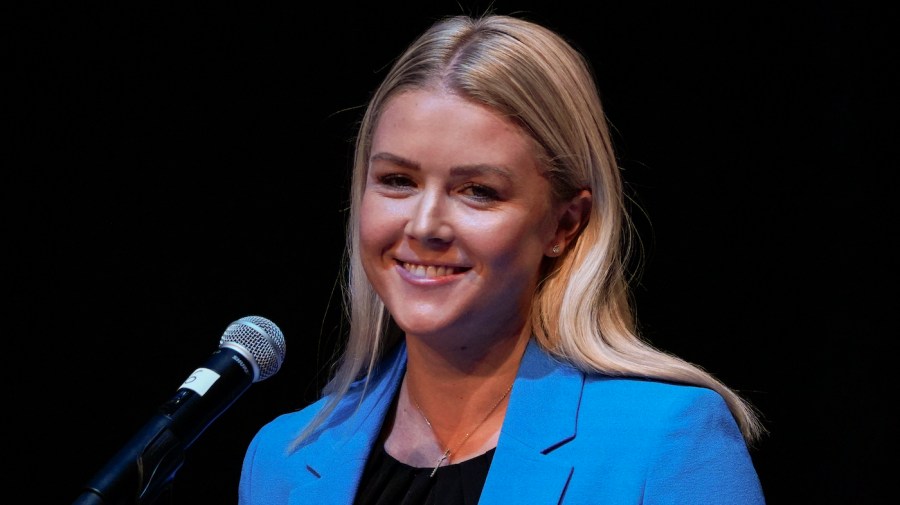
New Hampshire Republican 1st Congressional District candidate Karoline Leavitt smiles as she speaks during a debate in Henniker, N.H.
Leavitt just made the cutoff to be eligible in the race: House members must be at least 25 years old, and Leavitt turned 25 in August.
Dittmar pointed to Rep. Alexandria Ocasio-Cortez (D-N.Y.) as an example of how young lawmakers govern and run their campaigns compared to their elders.
“You can look at all the different ways in which her age has influenced how she’s done her job, some of the issues that she’s brought forward, how she’s even run her office in ways that might be different,” Dittmar said, “and certainly how she campaigns and like her use of social media and her effective use of what have been more kind of generational digital strategies.”
Some states could see their first Latina lawmakers in Washington
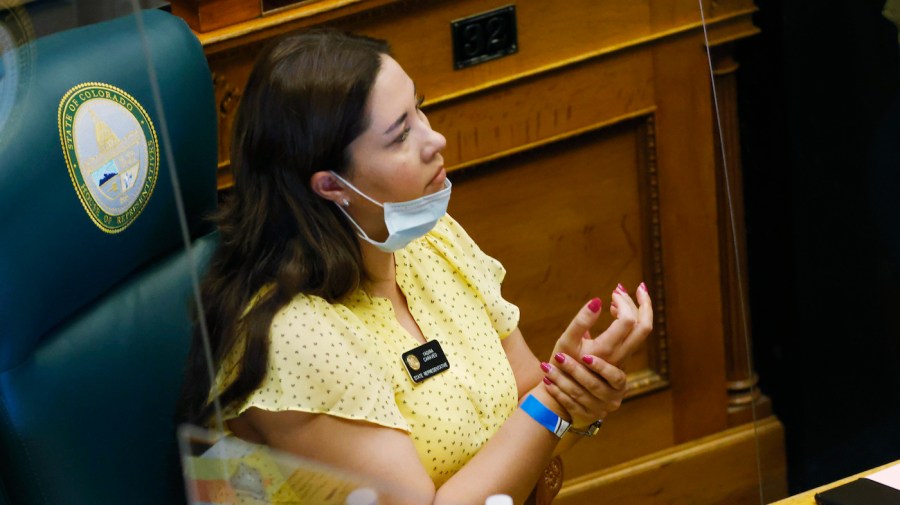
Colorado Representative Yadira Caraveo, D-Thornton, waits for the start of the session in the House chamber as lawmakers try to wrap up the calendar in the State Capitol in Denver.
State Rep. Delia Ramirez (D) in Illinois; Lori Chavez-DeRemer (R) and state Rep. Andrea Salinas (D) in Oregon; and state Rep. Yadira Caraveo (D) in Colorado are just some of the candidates who could make history as the first Latinas to represent Congress in their states.
Ramirez, a progressive, is running in Illinois’s 3rd Congressional District. Chavez-DeRemer, a former mayor of Happy Valley, Ore., is running in the state’s 5th Congressional District, which has been rated as a “toss up” by the Cook Political Report, while Salinas is running in Oregon’s new 6th Congressional District.
Caraveo is running in Colorado’s 8th Congressional District, considered a “toss up” for this cycle, and has been endorsed by the Bold PAC, the Congressional Hispanic Caucus’s campaign arm.
Copyright 2024 Nexstar Media Inc. All rights reserved. This material may not be published, broadcast, rewritten, or redistributed..













